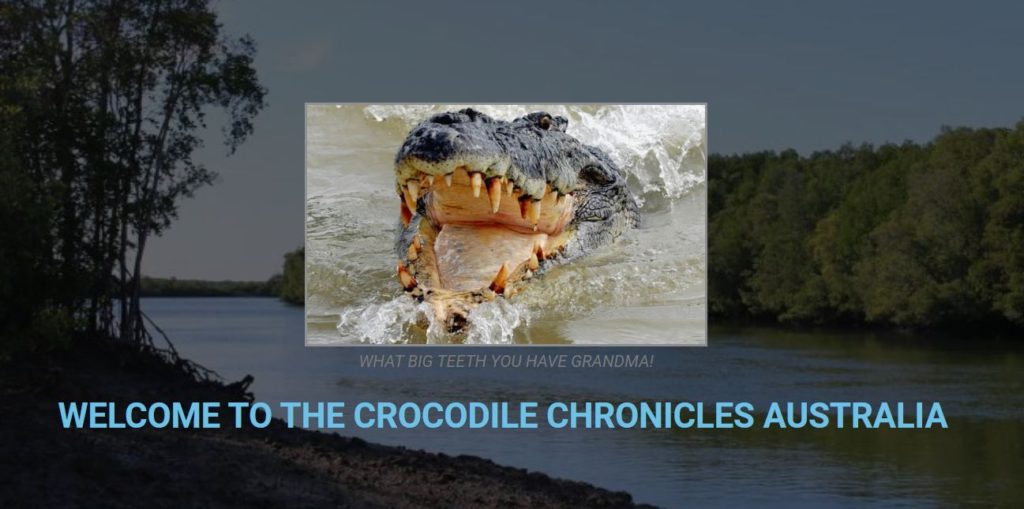Why I say that Bob Katter was right when he said “every three months a person is torn to pieces by a crocodile in north Queensland.”

First I do have to admit I am angry. And why am I angry? The reason is there are a heck of a lot of people who have decided to put crocodiles before humans. People are being hurt.
People are being killed. You can look at what is wrong in two different ways:
Torn to pieces or not? A basic human right.
The places that I enjoyed so much in the sixties, those places where I swam, fished, and hunted are no longer safe. In fact, these places are now extremely dangerous to the point where the slightest misadventure could be fatal.
Torn to pieces, literally, psychologically, or just plain scared.
Second, and a hell of a lot more serious, is that a considerable number of people believe that the life of a crocodile is worth more than the life of a young girl, or a teenage boy, or some hapless tourist. For their own, and very different reasons, these people believe that human beings have less value than a giant killing machine, for that is what a large saltwater crocodile really is.
That is not right!
I have created my own database and I am heading towards 600 attacks by crocodiles since 1875. A lot of people have been killed or maimed
Thecrocodilechroniclesaustralia.com
Maybe it is time for a fact check on FACT CHECK.
Bob Katter said,
“Because in the meantime, every three months a person is torn to pieces by a crocodile in north Queensland.”
Does Mr Katter’s claim check out? Before we answer the question I put it to you that Katter used emotive language.
1. What Is Emotive Language?
According to Grammar Monster: Emotive language is the deliberate choice of words to elicit emotion (usually to influence).
https://www.grammar-monster.com/glossary/emotive_language.htm
I believe I am correct in saying that this is exactly what Katter did.
Ideas can be expressed non-emotively. For example: The men were killed.
Perhaps it is fair to say that an expression carried out “non-emotively” would not have suited Katter’s agenda. I think his point was that too many people are being attacked by crocodiles. But does it make him “WRONG” if he chooses emotive language to get his point across?
Would he have been able to make his point if he used non-emotive words.
2. The “In Cold Blood” example.
It all depends on the words selected. For example: “The victims were executed in cold blood”.
Katter may have focused on emotion rather than facts, but this is a good comparison because the expression as used above does not need explanation. There is no requirement for verification.
Let’s face it!
We all know “in cold blood” does not actually mean that the person has cold blood. We know that it means without much in the way of sympathy or care.
While thinking about “In Cold Blood” one might find an analysis of Truman Capote’s book of that name to be of some interest.
I will provide just this single excerpt from Melissa W. Noel’s examination of the language used in Truman Capote’s book “In Cold Blood”. Melissa said that she felt this examination could help students develop greater awareness of authors’ intentions and how writers use their language choices to influence readers.
Read: “A Cold Manipulation of Language”
“Since In Cold Blood walks the line between fiction and nonfiction, it makes an excellent study for a class that wants to discuss “purpose” and “audience,” as the author deliberately takes readers where Capote wants them to go—into the mind of Perry Smith, a man that he possibly cared for more than we want to know about.”
http://www.ncte.org/library/NCTEFiles/Resources/Journals/EJ/1004-mar2011/EJ1004Cold.pdf
Emotive language is designed to tell you the facts while influencing you to adopt the author’s opinion.
3. For the sake of clarity I offer the Grammar Monster examples of emotive language.
1. Example One.
Non-emotive version: Mr Smith was attacked by Mr Jones for two minutes.
Emotive version: For what seemed a lifetime, Mr Smith was subjected to a vicious, cowardly assault by the unemployed, steroid-pumped monster.
2. Example Two.
Non-emotive version of Katter statement.
Katter could have reported, in non-emotive terms: On average, four people are attacked and mauled each year.
And by the way, in terms of fact, this statement might even be more close to “right” than “wrong” More on that later.
4. Emotive version actually employed:
Bob Katter did use emotive language, “Because in the meantime, every three months a person is torn to pieces by a crocodile in north Queensland,”
It has been put that Katter was wrong. It has been put that the facts tell a different story. What was he trying to say?
The facts are that in Queensland 2017 it was reported that three people were attacked by crocs and two were killed by crocs.
Another person was killed in 2018.
Why focus on the language, citing issues with facts, when the message being delivered is that something is going on. And it is not right!
Forgetting about the “exact” facts, the truth is horrible.
5. Example of poor focus when checking facts.
I will provide my own example to show why Fact Check is wrong.
Say that I write that “Hitler is invading Poland with an army of 3 million men”.
Fact Check discovers that Hitler’s army comprises only 2.5 million men.
So Fact Check says that I am wrong.
Hey! Guess what? My message, and I think it is pretty clear, is that Hitler is invading Poland.
Oh my God. A disaster…………………..
Do I need someone to diminish the meaning of my message by this sort of analysis of facts?
The Katter statement (in its literal sense) is contrary to the truth in that the statement “every three months a person is torn to pieces by a crocodile in north Queensland,” is not entirely accurate.
Should a lack of accuracy be the end of it?
Suppose the true situation is that every year 8 people are attacked? Would that have any bearing on the matter?
Does anyone really know the answer?
I think not, because to begin with not all attacks are reported and/or recorded. Some of this depends on whether the “victim” bothers to report the attack.
Or the recording process might determine that the attack does not warrant the label: “Attack.”
Through my contacts with family and friends in Darwin I have been able to establish significant numbers of attacks, or thwarted attacks. Both my brothers, Kel and Bryan, and also Kel’s son Sam have given me a report indicating that they were very close to being in the newspaper with big splashes about a croc attack. It didn’t happen because they were vigilant. I will argue that there are huge numbers of people who almost got too close to the action.
I think that if people are hurt or “mauled” we will get to know about it.

6. Torn to pieces and attention.
But is Katter really trying to get attention to the attacks……….and the risk posed by said attacks?
Inadequate records – interpretation of the word “attack”. What is an attack? If a boat is attacked, is this an attack on people? Supposedly not, but what if a boat was attacked, and that caused or contributed to death?
An example of this is the case of the late Noel Ramage. Was it an attack by a crocodile?
The coroner’s report says “death due to drowning” but offers up three significant points:
1. Noel was so concerned about the possibility of a crocodile attack that he altered the design of his punt (flat bottomed boat). A contributing factor?
2. At the crisis point Noel shouted “crocodile” and appeared to be quite alarmed. He either saw a crocodile or thought he did. And he reacted to what he perceived as a threat.
3. The boat capsized and the end result of all that was that Noel drowned. But there were crocodiles present, as Ray, the survivor, reported that he saw crocodiles in the water. He said he had to persuade them to keep their distance.
OK. There was no crocodile attack in the sense that no crocodile laid gloves on Noel. But on the other hand, one could argue that this all came about due to the presence of these giant killing machines. And their well-deserved reputation for violence.
You say, “Oh, well, he could have stayed home in bed – would have been safe”.
But he did not. Just think about it for one second.
A man is following you. He looks sinister. Evil.
You notice he has a knife. You see that the knife is long and sharp.
You become very concerned, and you keep turning your head back and forth to keep him in view as you hurry down the street.
He is closer!
You step off the footpath onto the road. And Bang!
You are hit by a big bus.
You are dead.
In the paper the next day it is reported.
Accident in street. Man run over and killed by bus.
Cause of death: road accident involving bus.
7. Torn to pieces and our crocodiles.
Suppose that each year 4 boats are attacked?
Before you rule this out please note that when the famous crocodile called Sweetheart attacked a number of boats, back in the 70s, the attacks did not have enough significance to warrant being included in the records of crocodile attacks.
The author reports that my brother Kel was in the boat when it was attacked. My brother Kel, who was very often “in the boat” says he cannot remember the attack. Now I do not know if the author is wrong or in the alternative, the attack was so terrifying that it caused my brother to employ his brain to destroy all memory of same, but the laws of probability indicate that he may have been in the boat, sans memory.
Kel doesn’t remember it. The truth is that not many people took this seriously. But in each of the attacks the outcome could have been different. Quite different.
Or suppose each year 2 people die without there being real evidence of a crocodile attack?
Will this be recorded as an attack by a crocodile? No.
Is there any record suggesting that a crocodile was involved in an incident that led to a death? No.
The answer is often “no” even though a crocodile was present and did possibly contribute to the death.
Crocs and Bob Katter’s statement.
The facts are, without dispute, that :
a. more people are being attacked and
b. The attacks are more frequent than what is officially reported?
No-one really knows the full story. When a croc charged through the water toward my brother Bryan, he was saved by the vigilance of a young friend. No-one reported this as an “attack.”
8. I want to focus now on the Fact Check article.
Quote: Crocodiles in Australia
“Fact Check considers the phrase “torn to pieces” to mean a person has died.”
I think this statement is preposterous. I think that it is much more of an exaggeration than Katter’s emotive language.
That is one hell of a jump. Surely it does not really mean that!
For one reason or another people are torn to pieces and put back together again by the miracle of modern medical science.
One cannot determine that “torn to pieces” means a person has died.
But without talking about literal meanings, is Katter’s statement so far wrong? It is definitely emotive.
OK. “Torn to pieces” is emotive, but in my opinion what it really means is that some people (too many) are horribly “savaged” by these giant killing machines.
Just in case I am attacked on the meaning of words the meaning of the word “savaged” is set out below, for your consideration.
Surely, the “death part” of all this is really an incidental, in that all people attacked, whether killed, torn about to some extent, torn to pieces, or just plain terrified by what they saw, fits the bill, well at least from the emotive point of view.
savage
verb
past tense: savaged; past participle: savaged
1. (especially of a dog or wild animal) attack ferociously and maul.
“police are rounding up dogs after a girl was savaged”
synonyms:
maul, attack, tear to pieces, lacerate, claw, bite, mutilate, mangle;
“11-year-old Kelly was savaged by two Rottweilers”
o subject to a vicious verbal attack; criticize brutally.
“he savaged the government for wasting billions in their failed bid to prop up the pound”
synonyms:
criticize severely, attack, lambaste, condemn, flay, shoot down, pillory, revile; More
SOURCE:
All right. We can say that someone is savaged in the verbal sense so the word does have a broad meaning.
Really, I think it is fair to say that Fact Check both savaged and tore to pieces Bob Katter over his statement.
Katter’s emotive language vs. the cool, clinical, precise language of the professional.
In all honesty, it seems that there are enough people out there to get clinical and/or purely focus on the rights of animals etc.
Perhaps there is a need for emotion, too. Perhaps we need someone to speak on the matter using emotive language.
My own example of emotive language may be closer to the point.
A. “Someone, I dunno who, but somone’s kid got attacked by a croc. Had to go to hospital for surgery – she’s O.K. but.”
B. My little girl, Jill, only five years old, was attacked by a 5 metre crocodile weighing over 800kg. The huge beast leapt upon her and brutally savaged her innocent body. She was terrified beyond belief. Months in hospital, surgery involving repeated debridement, cutting away the dead flesh, large numbers of stitches to close the ruined flesh, massive does of antibiotics to prevent the filthy bacteria from the croc’s mouth doing what the teeth could not, have kept my little angel alive, but she will not even look at a river again for fear of a repeat episode of horror.”
Cool, clinical examination does not bring back a 68 year old woman or an 8 year old child.
DO NOT LOOK AT THIS UNLESS YOU WANT TO BE SHOCKED BY THE RESULT OF CROC ATTACK.

Are we so callous that we can only react when the horror is too close to home, our home?
There does seem to be more silence, or more of the lonely cry of the single voice when it comes to human rights. (Emotive or not?).
I add my cry to the lamentations of those actually affected by the horrors of a crocodile attack.
Leighton Clark